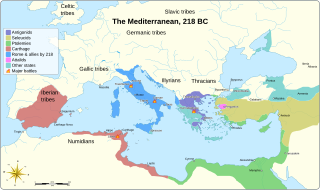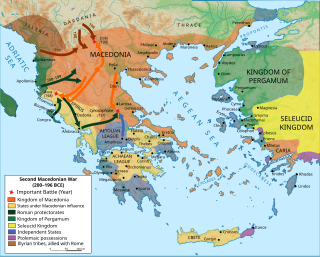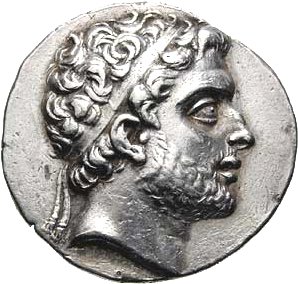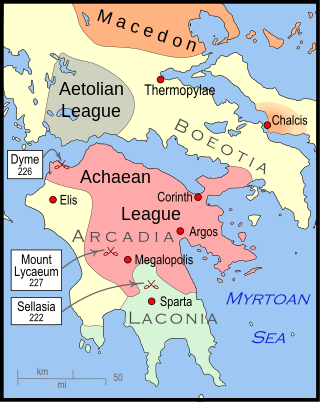
Philip V was king of the ancient Greek kingdom of Macedon from 221 to 179 BC. Philip's reign was principally marked by the Social War in Greece and a struggle with the emerging power of the Roman Republic. He would lead Macedon against Rome in the First and Second Macedonian Wars. While he lost the latter, Philip later allied with Rome against Antiochus III in the Roman-Seleucid War. He died in 179 BC from illness after efforts to recover the military and economic condition of Macedonia and passed the throne onto his elder son, Perseus of Macedon.

Aetolia is a mountainous region of Greece on the north coast of the Gulf of Corinth, forming the eastern part of the modern regional unit of Aetolia-Acarnania.

The First Macedonian War was fought by Rome, allied with the Aetolian League and Attalus I of Pergamon, against Philip V of Macedon, contemporaneously with the Second Punic War against Carthage. There were no decisive engagements, and the war ended in a stalemate.

The Second Macedonian War was fought between Macedon, led by Philip V of Macedon, and Rome, allied with Pergamon and Rhodes. Philip was defeated and was forced to abandon all possessions in southern Greece, Thrace and Asia Minor. During their intervention, although the Romans declared the "freedom of the Greeks" against the rule from the Macedonian kingdom, the war marked a significant stage in increasing Roman intervention in the affairs of the eastern Mediterranean, which would eventually lead to Rome's conquest of the entire region.
Publius Sulpicius Galba Maximus was a Roman military officer and Senator who was elected Roman consul twice, and appointed dictator once. He fought in the Second Punic War and the First and Second Macedonian Wars.

Nabis was the last king of independent Sparta. He was probably a member of the Heracleidae, and he ruled from 207 BC to 192 BC, during the years of the First and Second Macedonian Wars and the eponymous "War against Nabis", i.e. against him. After taking the throne by executing two claimants, he began rebuilding Sparta's power. During the Second Macedonian War, Nabis sided with King Philip V of Macedon and in return he received the city of Argos. However, when the war began to turn against the Macedonians, he defected to Rome. After the war, the Romans, urged by the Achaean League, attacked Nabis and defeated him. He then was assassinated in 192 BC by the Aetolian League. He represented the last phase of Sparta's reformist period.

Hellenistic Greece is the historical period of Ancient Greece following Classical Greece and between the death of Alexander the Great in 323 BC and the annexation of the classical Greek Achaean League heartlands by the Roman Republic. This culminated at the Battle of Corinth in 146 BC, a crushing Roman victory in the Peloponnese that led to the destruction of Corinth and ushered in the period of Roman Greece. Hellenistic Greece's definitive end was with the Battle of Actium in 31 BC, when the future emperor Augustus defeated Greek Ptolemaic queen Cleopatra VII and Mark Antony, the next year taking over Alexandria, the last great center of Hellenistic Greece.

Eumenes II Soter was a ruler of Pergamon, and a son of Attalus I Soter and queen Apollonis and a member of the Attalid dynasty of Pergamon.

Philopoemen was a skilled Greek general and statesman, who was Achaean strategos on eight occasions.
Scerdilaidas or Skerdilaid was an Illyrian ruler of the Illyrian kingdom under the Labeatan dynasty. Before taking the throne, Scerdilaidas was commander of the Illyrian armies and played a major role in the Illyrian Wars against the Romans.

The Battle of Chios was fought in 201 BC between the fleet of Philip V of Macedon and the combined fleet of Rhodes, Pergamum, Byzantium and Cyzicus.
The First Battle of Lamia was fought in 209 BC between the forces of Philip V of Macedon and the Aetolians led by Pyrrhias. The Aetolians were aided by a small Roman force and a force from the kingdom of Pergamon. The Macedonians were victorious. Another battle was fought at Lamia within the year.
Marcus Valerius Laevinus was a Roman consul and commander who rose to prominence during the Second Punic War and corresponding First Macedonian War. A member of the gens Valeria, an old patrician family believed to have migrated to Rome under the Sabine king T. Tatius, Laevinus played an integral role in the containment of the Macedonian threat.

Attalus I, surnamed Soter, was the ruler of the Greek polis of Pergamon and the larger Pergamene Kingdom from 241 BC to 197 BC. He was the adopted son of King Eumenes I, whom he succeeded, and was the first of the Attalid dynasty to assume the title of king, sometime around 240 to 235 BC. He was the son of Attalus and his wife Antiochis.

The Cretan War was fought by King Philip V of Macedon, the Aetolian League, many Cretan cities and Spartan pirates against the forces of Rhodes and later Attalus I of Pergamum, Byzantium, Cyzicus, Athens, and Knossos.

The Laconian War of 195 BC was fought between the Greek city-state of Sparta and a coalition composed of Rome, the Achaean League, Pergamum, Rhodes, and Macedon.
Alexander, surnamed Isius (Ἴσιος), the chief commander of the Aetolians, was a man of considerable ability and eloquence for an Aetolian. In 205 BC, Alexander Isios opposed Dorimachus and Scopas, who were elected by the Aetolians as legislators to reform Aetolian legislation. In 198 BC he was present at a colloquy held at Nicaea on the Maliac Gulf, and spoke against Philip V of Macedon, saying that the king ought to be compelled to quit Greece, and to restore to the Aetolians the towns which had formerly been subject to them. Philip, indignant at such a demand being made by an Aetolian, answered him in a speech from his ship. Soon after this meeting, he was sent as ambassador of the Aetolians to Rome, where, together with other envoys, he was to treat with the senate about peace, but at the same time to bring accusations against Philip. In 197 BC, Alexander again took part in a meeting, at which T. Quinctius Flamininus with his allies and king Philip were present, and at which peace with Philip was discussed. Alexander dissuaded his friends from any peaceful arrangement with Philip. In 195 BC, when a congress of all the Greek states that were allied with Rome was convoked by Flamininus at Corinth, for the purpose of considering the war that was to be undertaken against the Spartan king Nabis, Alexander spoke against the Athenians, and also insinuated that the Romans were acting fraudulently towards Greece. When in 189 BC, Marcus Fulvius Nobilior, after his victory over Antiochus III the Great, was expected to march into Aetolia, the Aetolians sent envoys to Athens and Rhodes; and Alexander Isius, together with Phaneas and Lycopus, were sent to Rome to sue for peace. Alexander, now an old man, was at the head of the embassy; but he and his colleagues were made prisoners in Cephallenia by the Epeirotes, for the purpose of extorting a heavy ransom. Alexander, however, although he was very wealthy, refused to pay it, and was accordingly kept in captivity for some days, after which he was liberated, at the command of the Romans, without any ransom.

The Social War, also War of the Allies and the Aetolian War, was fought from 220 BC to 217 BC between the Hellenic League under Philip V of Macedon and the Aetolian League, Sparta and Elis. It was ended with the Peace of Naupactus.
Scopas was an Aetolian general, who served both his native Aetolian League in the Social War and Ptolemaic Egypt against the Seleucids, with mixed success. He was executed in 196 BC at Alexandria for conspiring to seize the power of the realm for himself.
Pyrrhias was an Aetolian general, who was sent by his countrymen during the Social War, to take the command in Elis. Here he took advantage of the absence of Philip V of Macedon, and the incapacity of Eperatus the Achaean strategos, to make frequent incursions into the Achaean territories. Having established a fortified post on Mount Panachaikon, he laid waste the whole country as far as Rhion and Aigion. The next year he concerted a plan with Lycurgus, king of Sparta, for the invasion of Messenia. However, he failed in the execution of his part of the scheme, being repulsed by the Cyparissians before he could effect a junction with Lycurgus. In consequence he returned to Elis, but as the Eleans were dissatisfied with his conduct, he was shortly after recalled by the Aetolians and replaced by Euripidas. At a later period he obtained the office of strategos of the Aetolians, in the same year that this office was bestowed as an honorary title upon Attalus I, king of Pergamon. In the spring of that year he advanced with an army to Lamia to oppose the passage of Philip V of Macedon towards the Peloponnese. Though supported with an auxiliary force both by Attalus and by the Roman praetor Publius Sulpicius Galba Maximus, he was defeated by Philip in two successive battles and forced to retire within the walls of Lamia. It is not improbable that Sipyrrhicas, who appears in Livy (XXXI.46) as chief of the Aetolian deputation which met Attalus at Heracleia, is only a false reading for Pyrrhias.












